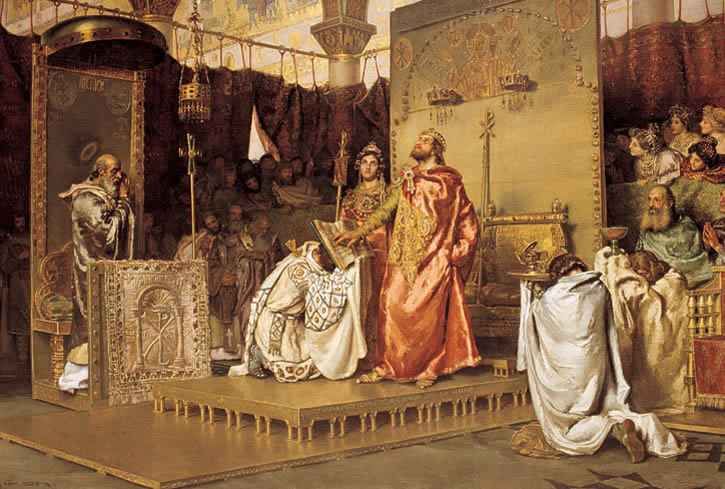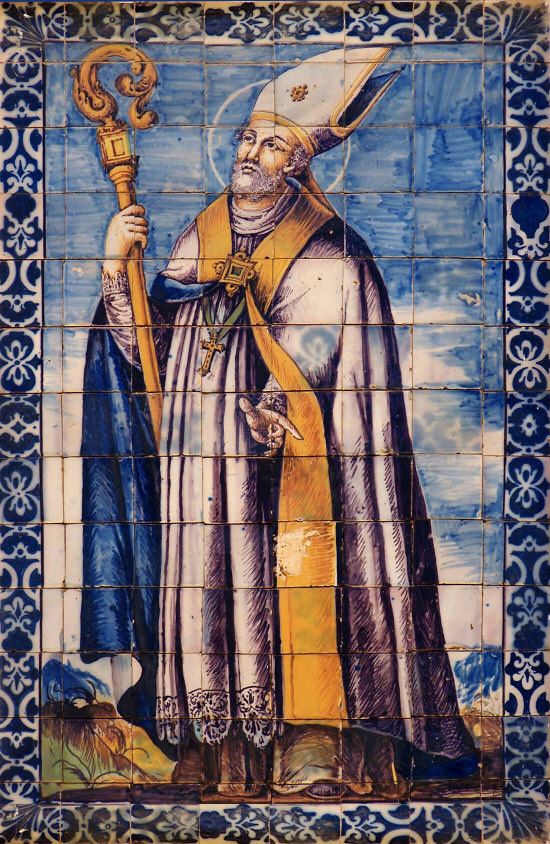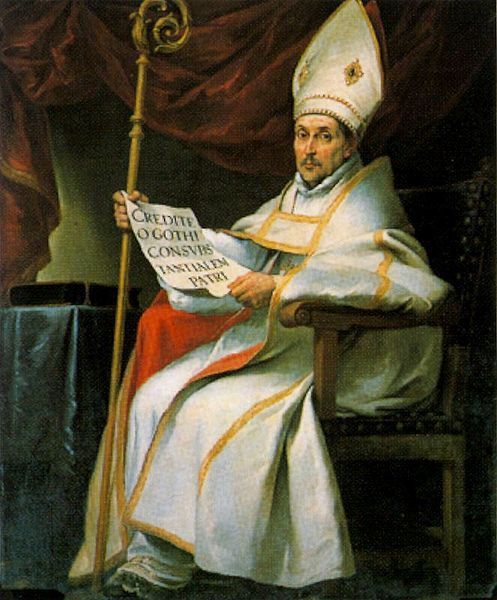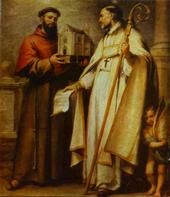Leander was born in Cartagena, Spain to pious parents, Severianus and Theodora. He was the eldest of four children, his younger brothers and sisters being Saint Isidore of Seville (who would succeed him as Bishop of Seville), Saint Fulgentius of Ecija (who became bishop of Cartagena), and Saint Florentina of Cartagena. (who would become an Abbess). The children spent their youth in pious and humble pursuits, and upon reaching the age of consent, Saint Leander entered a Benedictine monastery in Seville. There, he became a model of learning and piety, and as a monk earned the respect of both the religious and lay communities alike. In 579 he was elected Bishop of Seville, which he accepted, although continued to practice his life of austerity and penance, rather than adopt the more comfortable lifestyle of a bishop.
Spain, at that time in history, was experiencing considerable political upheaval, with the Visogoths dominating part of the territory. Not only had this invading force captured much of the land, their rulers had also spread the Arian heresy amongst the people, with many of the congregations and bishops accepting this affront to the divinity of Christ. Upon his election as bishop, Saint Leander immediately began to combat this heresy with all his strength, relying on the Lord, and seeing almost immediately the fruits of his labor. The heresy began to lose hold over the people, including the two sons of the Visogothic King Leovigild, Hermenegild and Reccared. These conversions angered the king considerably, and Leander was exiled to Constantinople.
In Constantinople, Leander met and became close friends with the Papal Legate stationed there, the future Pope Saint Gregory the Great. This action earned him the king's wrath and exile to Constantinople, where he met and became close friends of the Papal Legate, the future Pope Gregory the Great. Saint Leander served as a contemporary and advisor to Saint Gregory, encouraging him to write his famous commentary on the Book of Job entitled the “Moralia.”
After some time, King Leovigild summoned Leander back to Seville. Having experienced a change of heart, he wished for Leander to instruct his son Reccared—who would inherit the throne—in the ways of the faith. Through Leander’s instruction and model, the people of Spain were converted. He presided over the third Council of Toledo, which upheld the consubstantiality of the Trinity, and brought about many moral reforms in the Church. Saint Leader further wrote an influential Rule for Spanish nuns and introduced the practice of praying the Nicene Creed at Mass. A prolific writer, unfortunately most of his works have been lost to history, although much of the correspondence written by Gregory the Great to his attention remains extant.
 |
| King Leovigild rejects Arianism and embraces the true faith in front of Saint Leander |
After a long life of fighting heresies and preaching the truth, Saint Leander died around the year 600. He was succeeded by his brother, Isidore, who said of him: "This man of suave eloquence and eminent talent shone as brightly by his virtues as by his doctrine. By his faith and zeal the Gothic people have been converted from Arianism to the Catholic faith"
Saint Leander held to the truth of the faith, despite overwhelming opposition and exile. Not only did he believe the truth, he sought to bring others to the light of the faith through tireless work. As modern Christians, we rarely consider the work of these early defenders of the faith, who lived their lives in constant proclamation of the Kingdom of Heaven. We might, during this Lenten season, take a lesson from these holy men and women, not only believing our faith, but living it visibly as witness to others!
Saint Leander, pray for us that we will always seek truth, and never shy away from defending it. In Christ’s Name, we pray. Amen
Year 2: Day 72 of 365
Prayer Intentions: Lives of faith led visibly as witness.
Requested Intentions: For successful outcome to surgery (C); Healing for brother (M); Successful employment (C); For the victims of the Japanese tsunami/earthquake (J); Healing (E); For a son struggling with depression (B); Successful conception (M); Freedom from social anxiety; confidence in the Lord (J); Improved success in employment and studies (D); Freedom from illness (T); For a wife’s employment (E); Healing of a husband’s knee (M); Freedom from sickness (R); Healing (C); Restoration of marriage (F); Freedom from medical difficulties, employment, successful relationship (D); End to suffering for sick brother; reconciliation of estranged family (E); End to husband’s addiction; Improved relationship; strength (M); Successful God-centered marriage; Sacramental life (M); Healing, successful relationship (S); For successful marriage (A); For a husband’s freedom from addiction (C); Freedom from pain and illness for a friend (M); Financial freedom (J); Successful passing of occupational examination (S); Healing and conversion, sale of house (L); Occupational success for employee and colleagues (J); Employment for a son (C); Successful attainment of an important appointed position (J); Recovery from cancer for a friend (Z); For a family’s freedom from sin (M); For a daughter with Diabetes (A); Healing of a father following stroke (S).















0 comments:
Post a Comment
Thanks for leaving a comment. If you wish to submit a prayer request, however, please do so above, using the "Contact" tab.